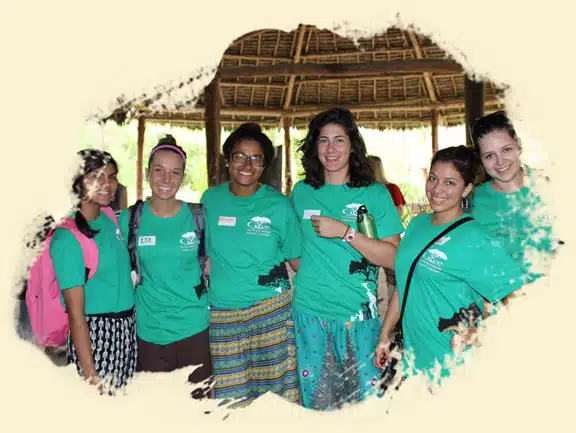GIVE: What Zanzibar Taught Me
Written by: Patreece Spence
10/12/2014
If you’re even remotely considering studying abroad, do it now.
Traveling to Tanzania this summer was the most memorable, rewarding, magnificent journey in my life thus far. I knew no one going into the experience and I had no clue what to expect. Completely blind of how such a simple experience would change my life, I hopped on a few planes and ended up on a beautiful island off the coast of Tanzania called Zanzibar. Over the two weeks spent in Zanzibar, I know I made a difference. Everyone did.
Each morning, we split up after breakfast; some of our group members went to construction, where they sustainably worked hard day in and day out to construct a school for the local village of Cairo. The other part of the group taught English to local students each morning. I mostly took part in tutoring, but we were given the option to participate in both aspects of the volunteer work. Although the students referred to me as “my teacher” with broken Swahili accents, they taught me more than I could ever dream to teach them.
The students on Zanzibar are self-motivated and know that, for future opportunities, they must learn English. Zanzibar’s economy is tourist-based, so speaking English is essential when searching for jobs. Some students have dreams of travelling to America, this seemingly utopian world. Others have dreams to attend college and return to improve their native villages. These students seized every opportunity to practice their English. They excitedly attended tutoring each morning. This started with the younger children, who would sprint up and wait at the gate to come play at what they sweetly called “schooly”.



The older students followed, always motivated and ready to ask questions. Interestingly enough, the students here are intrinsically motivated, some concept that seems foreign on college campuses nowadays. Many students in the U.S. for instance are extrinsically motivated. Mom and dad promise to take their daughters shopping when they do well in school and show all A’s on their report cards. This ruins any possibility of intrinsic motivation and leaves students reaching for unnecessary material objects.
The students on Zanzibar are self-motivated and know that, for future opportunities, they must learn English. Zanzibar’s economy is tourist-based, so speaking English is essential when searching for jobs. Some students have dreams of traveling to America, this seemingly utopian world. Others have dreams to attend college and return to improve their native villages.


The students we taught in kairo still come to class every day and still have huge dreams; they don’t give up.

Some afternoons, I had the pleasure of tutoring Mcheni, a student whose English was noticeably strong.
After going over some grammatical rules and practicing reading comprehension over and over again, he asked that I start teaching him Spanish. At first, I was so confused. I’m just about fluent in French and an English major, so I didn’t think that my one year of Spanish 1 as a senior in high school would cut it. However, I was wrong. Mcheni was motivated to improve yet another language. He spoke impressively in English and Italian, in addition to his native Swahili. He wanted me to teach him Spanish, his thought process being that Italian is similar to Spanish and he could probably pick it up quickly and actually use it when conversing with tourists.
So, I taught him what I knew, which is not very much, but regardless, he was ever so gracious. The very next afternoon, he brought a Spanish-English dictionary to tutoring. He said he had walked over to a neighboring village and borrowed it, hopeful that it would assist me and therefore, broaden his Spanish knowledge. I spent two hours writing pages of Spanish notes for him.
We sat together in the partially built school as the sun set and practiced speaking in Spanish, working on our pronunciation and learning some common phrases. He would keep the notes that I wrote for him in his pocket, and he claimed he’d hang them on his wall so that he could look at them every day. Despite my lack of knowledge, Mcheni really appreciated the effort I put in to teaching him a language foreign both him and me. These students have limited resources, but literally go the extra mile to achieve whatever goals they set their minds to.
From then on, any time Mcheni and I saw each other, we would communicate only in Spanish, or at least try our best.
We studied lots of greetings and goodbyes, and typically used phrases like “hasta la vista” or “hasta mañana”, the latter meaning “see you tomorrow.” At dinner on our last night in Zanzibar, Mcheni walked by and said “hasta mañana” and it hit me like a truck. I wouldn’t have the chance to see him tomorrow, or any of the locals. Mañana, we were heading back to the mainland and I was beginning my journey back to the realities of small-town Newark, DE. While I may have taught him English grammar and useful Spanish phrases as best I could, he taught me much more, as did everyone in Zanzibar. The honesty of the locals, their welcoming disposition, and their appreciation for the beauty of life all make this experience a difficult one to forget.
Now back at school, I sit in the back of college lecture halls and flip through the thousands of photographs I took on the trip. I know that I’ve learned much more spending three weeks volunteering in Zanzibar than I ever will sitting in a lecture hall for a semester at any university. Life is about experience and we must completely submerse ourselves in different cultures in order to really see how they live.


